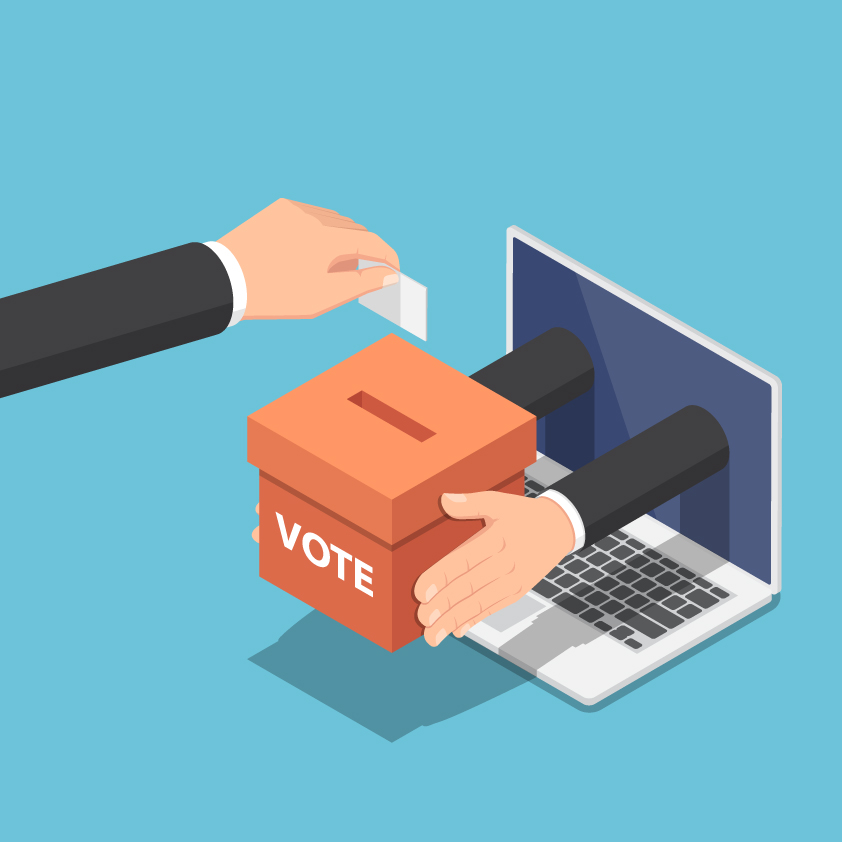E-voting – alternative forms of voting and how to make them secure
-
Type of event:
Public expert discussion
-
Venue:
Deutscher Bundestag, Platz der Republik 1, 11011 Berlin
Jakob-Kaiser-Haus, Sitzungssaal 1 302
-
Date:
06.04.2022
-
Time:
15.00 to 17.30
-
Broadcast:
Documentation of the event on bundestag.de ; Recording in the YouTube Channel of the German Bundestages (with auto-generated subtitles
What was it about?
The aim of electronic voting, e.g. online via a home PC or smartphone, aims at creating a complementary option to conventional voting by ballot paper or postal voting. Comparable to postal voting, online voting can make it easier for voter groups to participate in elections – especially for those who encounter access barriers in conventional voting procedures, i. a. people with physical disabilities, older adults or people who are living abroad temporarily or permanently. Recent research also suggests that with the option of e-voting, the turn-out of non-voters and occasional voters might increase. In the wake of the COVID-19 pandemic and the required social distancing involved, online voting has gained additional importance.
Besides the advantages of online voting, however, an increased risk of manipulation of elections is assumed, which might result in problems regarding trust and acceptance. Moreover, some fear that online voting might lead to a trivialisation of the act of voting and violate important principles of political elections, such as the principle that elections should be subject to public scrutiny throughout the electoral process.
VDI/VDE-IT, as a consortium partner of the Office of Technology Assessment at the German Parliament (TAB), is currently conducting a TA short study on the advantages and disadvantages of e-voting compared to conventional voting methods. The interim results of the short study were presented in the form of a thesis paper* (in German) and discussed with experts at a public expert meeting.
The following questions guided the discussion:
- What are the advantages and disadvantages of e-voting as well as drivers and barriers for its introduction?
- To what extent does e-voting fulfill the principles of electoral law - generality of the vote, freedom of the vote, electoral equality, secrecy of the ballot, and publicity of the vote - compared to other voting methods (absentee voting and voting at polling stations)?
- Are individual verification of the vote by the voter (vote was registered and counted for the party or candidate for which it was intended) and universal verification (the integrity of the entire election result is verifiable) possible with e-voting and can online elections be implemented securely?
Programme
| 15.00 |
Welcome
Moderation of the expert discussion
|
| 3.05 p.m. |
Keynote speech "E-Voting
|
| 3.20 p.m. |
Introduction to the thesis paper
|
| 3.35 p.m. |
Discussion with experts
|
| 4:45 p.m. | Closing discussion: Should e-voting be used in federal elections in Germany - what would be the requirements? |
| 5.30 p.m. | End of the event |
Programme (PDF, only in German)
The expert discussion was broadcasted live on parliamentary television. Active participation was this time only possible for members or employees of the German Bundestag.
Further information
- Project page E-Voting - alternative forms of voting and how to make them secure
- Thesis paper* for the event (PDF, in German)
- E-Voting vorerst keine Option bei Bundestags- oder Landtagswahlen. Documentation and recording ot the event on the Parliament's website (only in German)
* The thesis paper is preliminary and summarizes the interim results and the current state of knowledge of the short study, which has been in preparation since July 2021, in the form of theses according to the understanding of the authors. It does not represent the final short study. This short study will also include the findings of the expert meeting on April 6, 2022.

